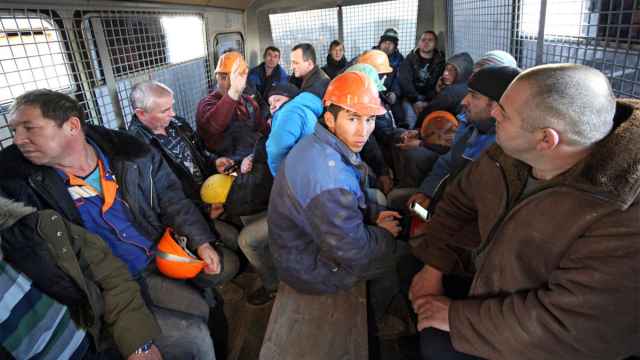Быстро-быстро: on the double
When I first arrived in Moscow with my very correct literary Russian, I had no problem understanding 19th century plays in the theater, but I had a great deal of trouble figuring out what my 20th century neighbors were talking about. I recall being particularly puzzled by the apparent name or nickname of the little girl who lived downstairs in my apartment building. Her mother would call out the window: Мухой! And the little girl would dash home. Мухой didn’t sound like the name of a little girl, but what was it short for? Мухалина? Мулета? Амухарена?
It was several weeks before I figured out that her name was actually Наташа, but it was several months before I finally discovered that Natasha’s mother was telling her to get inside fast — like a fly (муха in the instrumental case —мухой).
Oh, the joys and humiliations of second language acquisition.
Just for kicks, the other day I pulled down some reference books and started looking for synonyms for быстро (fast). I thought there would be a lot; I didn’t think there would be several hundred of them. It does make you think that Gogol was on to something when he wrote: какой же русский не любит быстрой езды? (what Russian doesn’t love to ride fast?) And if you love to ride fast, you need lots of words to describe it, I guess.
You can begin by playing around with the word itself, and so you might urge that dawdling child or slow-moving significant other to get going быстренько (fast, said nicely); быстрым шагом (at a fast pace); быстро-быстро (fast, said insistently); быстро-пребыстро (fast and I mean really fast). Or you could just shout Бегом! (Run! Literally “at a run”).
Another way of expressing it is with the phrase в два счёта (double quick, literally “in the count to two”). Apparently, this comes from military — perhaps even pre-Revolutionary — where soldiers have to do something as they count off Раз! Два! (One! Two!). For reasons I don’t quite understand, but am intrigued by, English sometimes uses “two” in speed expressions also, although the associations are very different. Напрямую, дворами да проулками, до школы можно было добраться в два счёта (If you took a straight path to school through courtyards and alleys, you could get there in two shakes of a lamb’s tail).
And then to describe speed there is a long list of comparisons, which in Russian can be expressed as “like…” with a noun in the instrumental case. This is where that little fly comes in. You can dash off шмелём (like a bee) or рысью (as like a lynx). You can kick up dust and run ветром (like the wind); вихрем (like a whirlwind). And in more recent centuries you could run пулей (like a bullet); пулемётом (like a machine gun); ракетой (like a missile); самолётом (like a plane); or торпедой (like a torpedo).
You might be as fast as a horse: За ней шла в школу Надя, вернее, не шла, а бежала галопом (Nadya walked into the school after her, or rather she didn’t walk, she galloped after her.)
There is another kind of gallop: галопом по Европам (“a gallop through Europe”). This phrase entered Russian in 1928 when the poet Alexander Zharov and his friends traveled around Czechoslovakia and Austria. Since the host nations weren’t happy with them, they hurried them from one place to another. Upon his return, Zharov wrote of his impressions in an article called Галопом по Европам and then got scolded by Maxim Gorky. Few remember the article or the scolding, but the phrase has stuck as the Russian equivalent of “if it’s Tuesday this must be Belgium,” that is, to describe doing anything at a fast pace and in a superficial way. Я преподавал литературу в школе и прекрасно понимаю, что все романы из обязательного списка литературы прочесть невозможно, а если школьник и попытается это сделать, то получится “галопом по Европам” (I taught literature in school and understand perfectly well that the students can’t possibly read all the novels in the list of required reading, and if they try, they’ll just “hit the peaks and skip the valleys.”)
Other images used in speed expressions involve heat and pain. Он мчался (He ran) как ошпаренный (like he was on fire, literally “scalded”); как на пожар (like he was racing to a fire); как ужаленный (like he’d been stung by a bee). You can also run like crazy, which is как угорелый — a state of madness induced by carbon monoxide poisoning. That this kind of poisoning became a common idiom suggests that I have a lot to learn about the development of Russian and Soviet heating systems. But I gather it’s the equivalent of “like a bat out of hell” — fast and frenzied.
Sometimes you rush or dash around so fast that you start to breathe heavily. In Russian doing things in a rush is впопыхах, a lovely word that is a fine example of onomatopoeia. But for a fast word it has a rather meandering origin story. First there was пыхтеть (to wheeze, pant, huff and puff), and since you start huffing and puffing when you are hurrying, that produced попыхи (haste, hustle and bustle), and then when you add the prefix в (in) and put the word in the prepositional case, you get впопыхах (in a rush). Он собрал впопыхах две сумки с одеждой между чисткой зубов и сигаретой (In a mad rush he packed two bags of clothes in between brushing his teeth and having a cigarette.)
I also like the phrase сломя голову (literally “breaking your head”) because it has an almost identical English language equivalent. Here it is in a sentence with no less than three speed expressions: Он приказал немедленно бежать без оглядки из дома на Кутузовском, подальше от заразы, сломя голову, прочь, прочь, прочь! (He ordered her to immediately run without looking back from the house on Kutuzovsky, to get as far away from the plague as you can, run at breakneck speed, away, away, away!)
Finally, you can run so fast that your heels shine. I guess the image is that they are shined by whatever a person is running through. In English, we might use a similar, albeit much weirder, expression: Соня кинулась искать ручку, Тася, сверкая пятками, убежала в сторону пляжа (Sonya dashed off to look for her pen while Tasya took off like greased lightning for the beach).
And speaking of rushing off — you can do it so fast it’s already happened. Надо успеть на почту. Я пошла! (I need to get to the post office. I’m out of here!)






